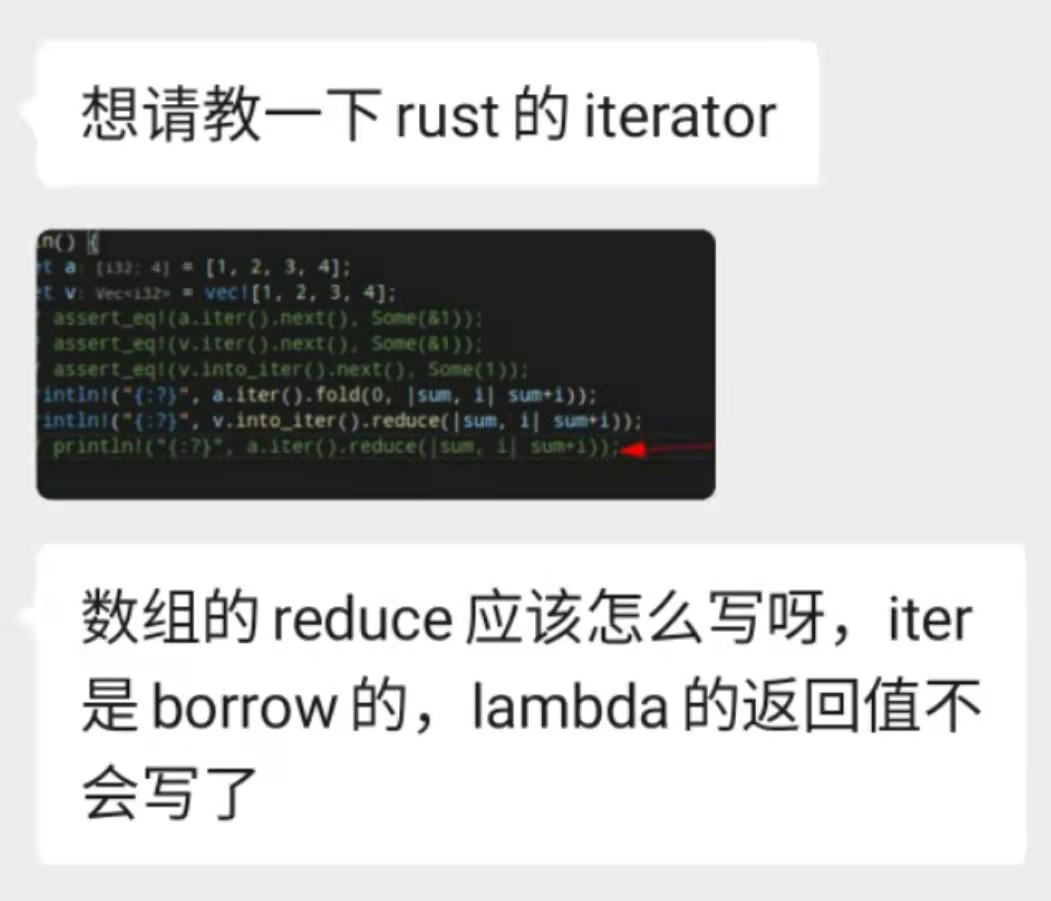到底怎么迭代一个Rust Array?
This is one of the legacy posts
到底怎么迭代一个Array?
前两天晚上摸鱼的时候看到同学发来的微信消息,当时没过脑子,只想了一句“数组也可以into_iter吧”就完了。

摸完之后自己试了一下,发现这样还是不可以:
let a = [1, 2, 3, 4];
let s = a.into_iter().reduce(|sum, i| sum + i);
println!("{}", s);
编译器要求reduce中的lambda返回类型是&i32而不是i32。这就奇了怪了:into_iter不是获得所有权的迭代吗?为什么要求引用呢?
于是去查文档,在这里查到了这个:
Prior to Rust 1.53, arrays did not implement
IntoIteratorby value, so the method callarray.into_iter()auto-referenced into a slice iterator. Right now, the old behavior is preserved in the 2015 and 2018 editions of Rust for compatibility, ignoringIntoIteratorby value. In the future, the behavior on the 2015 and 2018 edition might be made consistent to the behavior of later editions.Starting in the 2021 edition,
array.into_iter()will useIntoIteratornormally to iterate by value, anditer()should be used to iterate by reference like previous editions.
换言之,在Array没有实现IntoIterator的情况下,对Array做.into_iter()会被自动变成切片的迭代器。在Rust 1.53版本及之后且Rust Edition为2021(暂时,以后可能对2015和2018 Edition统一行为)时,才会采用新行为,默认对值迭代。
来到playground尝试一波:
fn main() {
let a = [1, 2, 3, 4];
println!("{}", a.into_iter().reduce(|sum, i| sum + i).unwrap());
}
以上代码在Stable version 1.55.0+2018 Edition下编译不通过,提示如下:
Compiling playground v0.0.1 (/playground)
error[E0308]: mismatched types
--> src/main.rs:3:50
|
3 | println!("{}", a.into_iter().reduce(|sum, i| sum + i).unwrap());
| ^^^^^^^
| |
| expected `&{integer}`, found integer
| help: consider borrowing here: `&(sum + i)`
For more information about this error, try `rustc --explain E0308`.
error: could not compile `playground` due to previous error
能看到,这里仍然要求返回值是&{integer}
将工具链改为Nightly version 1.56.0-nightly(我尝试的版本是50171c)+2021 Edition下则编译通过,打印10。
那么这里应该怎么写呢?
rust提供了一个类似reduce的函数fold,都是对容器元素从前到后逐个操作,但不同的是fold可以指定初值(和类型),而reduce没有初值。
这就意味着fold中的lambda要求是Fn(T, &i32) -> T,其中T是初值的类型,只要填入一个0就可以完美完成;而reduce中的lambda必须是Fn(&i32, &i32) -> &i32(显然,中间结果的地址没什么意义,所以没办法这么写)。
所以最后的解决方案远比切换到最新的版本和最新的nightly build简单得多:
fn main() {
let a = [1, 2, 3, 4];
println!("{}", a.into_iter().fold(0, |sum, ptr| sum + *ptr).unwrap());
}